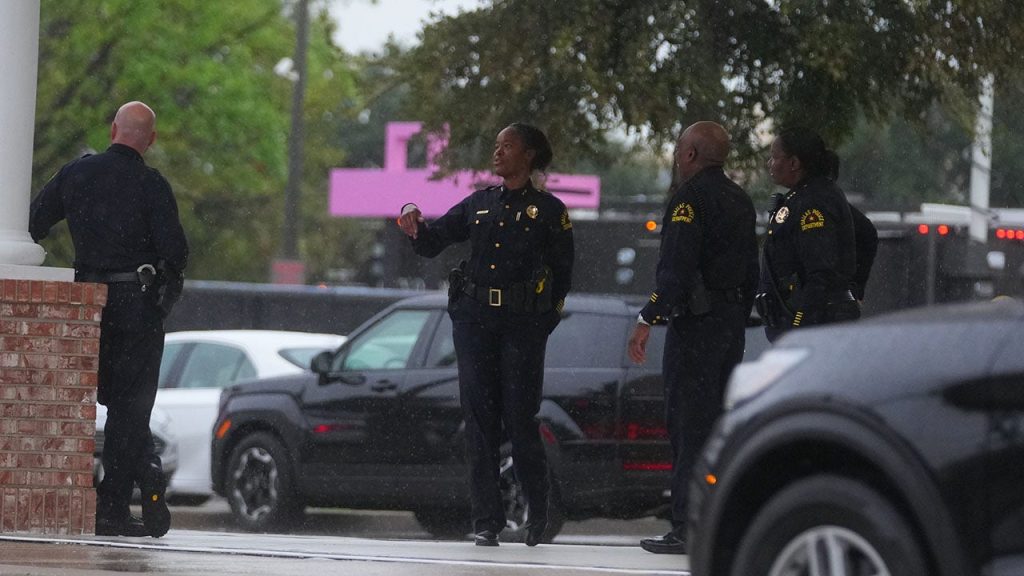Tragic Shooting at Dallas ICE Facility: A Reflection on Rising Violence Against Law Enforcement
On a fateful Wednesday morning in Dallas, a shocking act of violence unfolded at a U.S. Immigration and Customs Enforcement (ICE) facility that left one person dead and two others injured. The alleged attacker, identified as 29-year-old Joshua Jahn, positioned himself on a nearby rooftop and opened fire on an unmarked transport van carrying detainees before taking his own life. This tragic incident represents more than just another shooting in America—it speaks to a growing pattern of targeted attacks against immigration enforcement officers. The disturbing discovery of rifle ammunition engraved with “anti-ICE” messages found with the shooter points to a politically motivated attack, raising serious concerns about the increasingly dangerous rhetoric surrounding immigration enforcement in our country.
This Dallas shooting is particularly alarming as it comes just two months after another ambush at an ICE facility in Prarieland, Texas, located only miles away. In that earlier incident, sixteen individuals were charged in an ambush-style shooting of an Alvarado police officer who was simply responding to reports of vandalism. FBI Director Kash Patel condemned these attacks, emphasizing they are not isolated incidents but rather part of a disturbing trend of “despicable, politically motivated attacks against law enforcement.” His promise that the FBI would lead investigations to ensure those targeting law enforcement face justice reflects the gravity with which federal authorities view these escalating threats. The pattern suggests a coordinated effort or at least a growing sentiment that views immigration enforcement officers as legitimate targets—a dangerous development in a country already grappling with divisions over immigration policy.
The reaction from Texas officials was swift and pointed. Texas Attorney General Ken Paxton characterized the attack as “yet another despicable assault on law and order” and placed blame on what he described as an “epidemic of leftist political violence.” Governor Greg Abbott affirmed his state’s unwavering support for immigration enforcement officers, defiantly stating that such attacks “will NOT slow our arrest, detention, & deportation of illegal immigrants.” These responses highlight the deeply politicized nature of immigration enforcement in Texas and across the nation. While some view these statements as necessary support for law enforcement under attack, others might see them as further inflaming an already volatile situation by immediately framing the incident within partisan political narratives before a complete investigation could be conducted.
Vice President JD Vance joined the chorus calling for an end to “obsessive attacks” on law enforcement, particularly focusing on ICE agents who have become increasingly vilified in certain political circles. Homeland Security Secretary Kristi Noem went further, directly addressing what she sees as the root cause of such violence: rhetoric from the “far left” that demonizes immigration authorities. Her statement that “comparing ICE day in and day out to the Nazi Gestapo, the Secret Police, and slave patrols has consequences” draws a direct line between political rhetoric and violence. This perspective raises important questions about the responsibility of public figures and the media in how they frame contentious policy debates. Is it possible to strongly criticize government agencies and policies without inadvertently inspiring violence against the individuals who work within those systems?
Behind the political posturing lies a human tragedy that affects real people—both the victims of this shooting and the broader community of immigration enforcement officers who now must carry out their duties under heightened fear. As Secretary Noem poignantly noted, ICE agents are “fathers and mothers, sons and daughters” who simply want to return safely to their families after working to make communities safer. This humanizing reminder serves as a necessary counterbalance to the dehumanizing rhetoric that often surrounds discussions of immigration enforcement. Regardless of one’s position on immigration policy, most Americans would agree that violence against civil servants is never an acceptable form of political expression and only serves to further erode the possibility of productive dialogue on this contentious issue.
The Dallas ICE facility shooting represents a troubling escalation in a pattern of violence targeting immigration enforcement officials. It serves as a sobering reminder of how heated political rhetoric can potentially translate into deadly action. As investigations continue into the shooter’s background and motivations, the incident forces Americans to reflect on the state of our national discourse regarding immigration. Can we find ways to vigorously debate immigration policy while still respecting the humanity of those tasked with enforcing the law? The answer to this question may determine whether we can break this cycle of violence or if attacks like the one in Dallas become an increasingly common feature of America’s immigration debate. What remains clear is that continued violence will only deepen divisions and make meaningful immigration reform more difficult to achieve—an outcome that serves no one’s interests, regardless of political affiliation.


